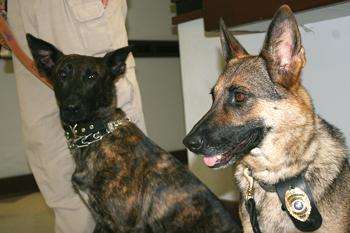When students enter Tiger Stadium on game day, police officers frisk them to make sure the University community remains safe during the game. But what students may not see is LSUPD’s bomb-sniffing dogs combing the stadium to eliminate any explosive threats to faithful fans. LSUPD has two explosive ordinance detection dogs – Mary, a 3-year-old Dutch Shepherd, and Sendy, a 2-year-old German Shepherd. The dogs, along with two Louisiana State Police dogs, are responsible for securing Tiger Stadium before games. “We use them specifically any time we have some type of event such as a football game,” said Major Lawrence Rabalais, LSUPD spokesperson. “We do a sweep of the stadium for any explosives. It’s taking extra measures to secure facilities such as the stadium and large venues.” The dogs, which have been part of LSUPD since June, have been called by state police and federal agencies to assist in some off-campus detail. Officer Jason Bettencourtt, Sendy’s handler, said the dogs have only been called off campus a few times, and their main responsibility is conducting pre-event searches on campus, primarily for football games. Bettencourtt said the LSUPD and state police dogs spend nearly two and a half hours each Friday night of a home game sweeping the stadium for suspicious items. He said they also conduct searches on game day. He said the dogs have not found any suspicious items this year. “Basically we do all the pre-game football sweeps,” Bettencourtt said. “On Friday night, we’ll do part of the stadium – locker rooms and things like that. And then Saturday morning, four hours before the games, we run them throughout the stadium. We do sweeps on both sides, all the levels and bathrooms and other easily accessible public areas. Our main concern is places where people can get.” Rabalais said if a threat was detected within Tiger Stadium, the area would immediately be secured by LSUPD and bomb technicians would handle disarming the explosive. “At that point we would secure the area and call bomb technicians in to determine whether this device is an actual device or if it’s something that would not cause any damage,” Rabalais said. Bettencourtt said the dogs will alert their handler of a threat through “passive alert.” He said the dogs simply sit and wait for a reward when they detect a scent they have been trained to recognize. “Basically what they’re doing is looking for their toy,” Bettencourtt said. “They know when they find that explosive scent, they get their toy. And that’s the difference between a bomb dog and a drug dog. A drug dog will actually scratch the area to tell you where it’s at. A bomb dog obviously can’t do that because if it’s pressure sensitive it can set it off. So they’ll just sit down right by it.” Bettencourtt said the dogs are trained to recognize about 14 different explosive scents. He said the trainers let the dog smell the scent and then teach them to sit. “They’re looking for the gasses that are coming off the explosive itself,” Bettencourtt said. “We can’t detect it, but the dogs can. They smell about 1,000 times better than we do.” Bettencourtt said ideally the dogs train five days per week for two hours each day. He said the dogs train in and around both the football stadium and the Pete Maravich Assembly Center. “We want them to be real familiar with that area, so it’s a really smooth transition for a real search,” Bettencourtt said. “Getting them exposed to it and getting them comfortable is the key.” Bettencourtt said as part of the dogs’ training, officers hide training explosive kits in real scenario locations. “We like to hide [the fake explosives] for each other,” Bettencourtt said. “That way we’re running blind, and we know it’s the dog who is finding the explosive, and not [the handler] who is cueing the dog to the explosive.” Bettencourtt said the dogs rarely make errors in training. He said when they do, it is often the fault of the handler more so than the dog. “If they ever miss something, that’s something we write down, and we take notes on it,” Bettencourtt said. “And that’s something we work extra hard on the next time.” Bettencourtt said the handlers are with their dogs all the time. He said constantly being with the dog allows the dog to be exposed to various environments, preparing them for any possible situation. He said he often brings Sendy to different areas around campus, such as the Student Union, to get her acquainted with them. “You try to prepare them for anything because you never know when or where you’ll have to do a search,” Bettencourtt said. “It could be in a thick crowd or on a hot surface or when you’re by yourself. And you just want to be ready for everything, which is why we expose them to as much as possible whenever possible.” Rabalais said there is no way to assess the possibility of a threat to Tiger Stadium. “The threat is there, yes, and in events such as LSU football [games] or large venues, the potential is there,” Rabalais said. “But I can’t say for sure as to if there’s a better chance it’d happen here than anywhere else. We’re just taking extra steps to make sure it doesn’t happen.” Some University students said having dogs secure the stadium before games is beneficial. “If anything, it just makes us safer,” said David Myrick, psychology senior. “It might be a little much, but ultimately it’s the old saying, ‘Better safe than sorry.'” Jessica Seiler, dietetics junior, said she thinks LSUPD is taking appropriate measures to ensure everyone’s safety. “I’m not saying we’ve ever really had a huge threat,” Seiler said. “But Tiger Stadium is a very popular place, and it’s very known for its fans, and it gets really crazy. Nowadays, you just never know. It’s always better to be prepared.” Bettencourtt said he also thinks the precaution is important for the safety of students. “It’s not that we get bomb threats every day,” Bettencourtt said. “It’s not really an issue on this campus. But you want to be prepared, or try to be as prepared as you can be. And having the dogs is another step towards that.”
—-Contact Nicholas Persac at [email protected]
Bomb-sniffing dogs help secure Tiger Stadium
By Nicholas Persac
October 2, 2007

Officer Mary (left), a Dutch Shepherd, and Officer Sendy, a German Shepherd, stand at attention in the LSU Public Safety Building on Monday afternoon. The two dogs comprise the LSU Police Departments bomb dog squad.
More to Discover







